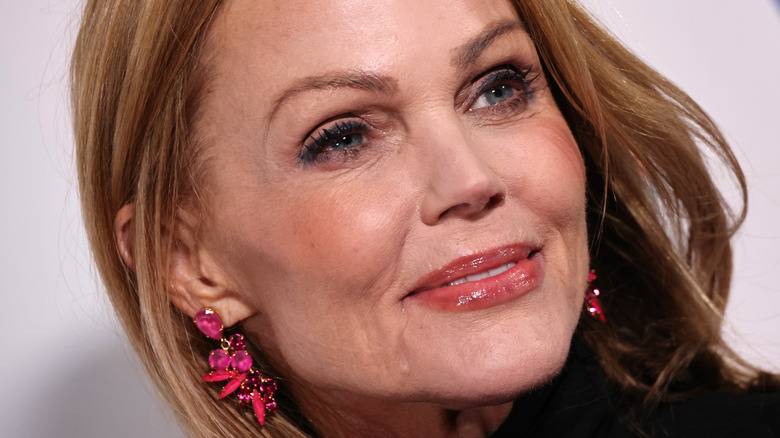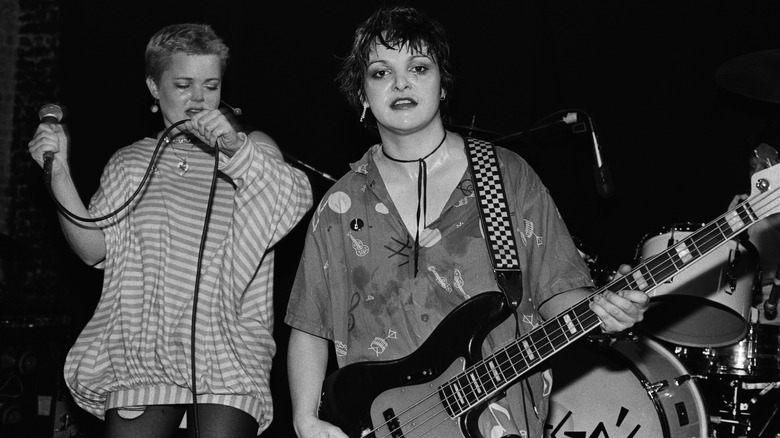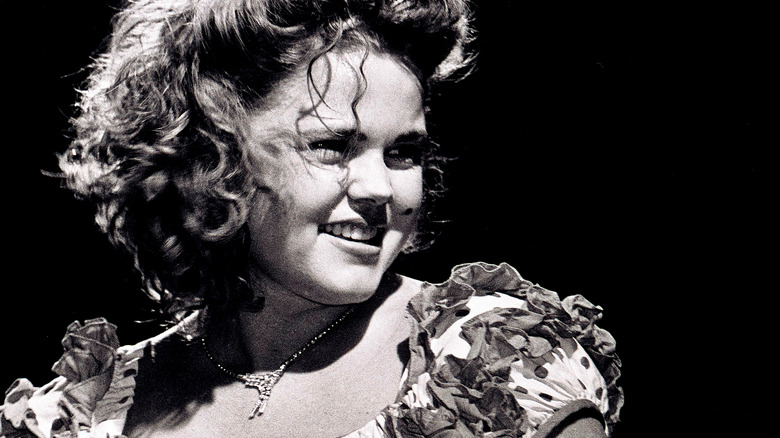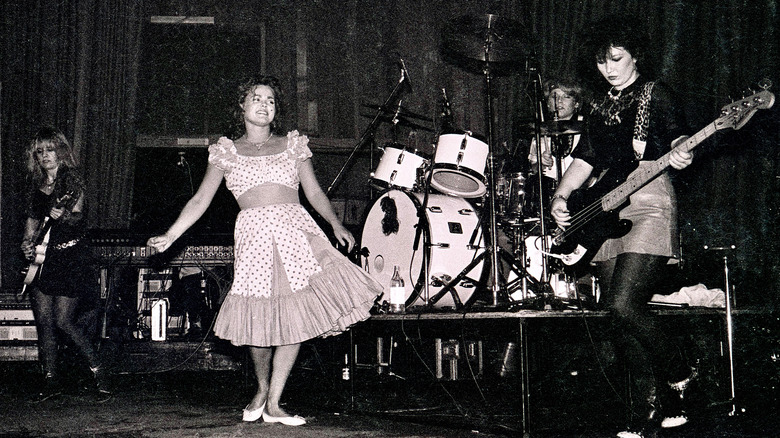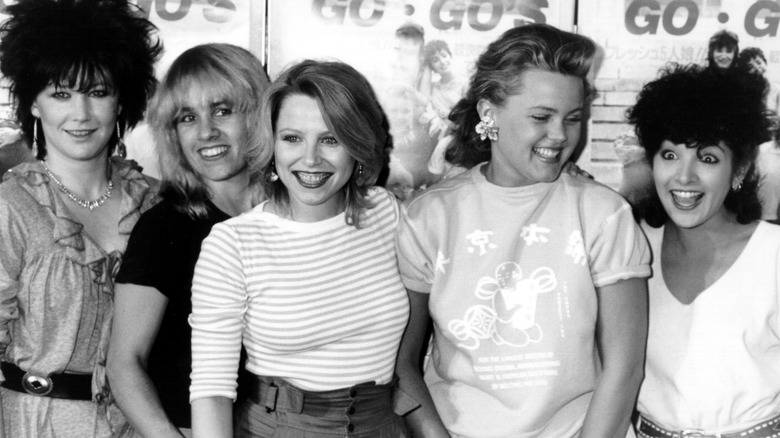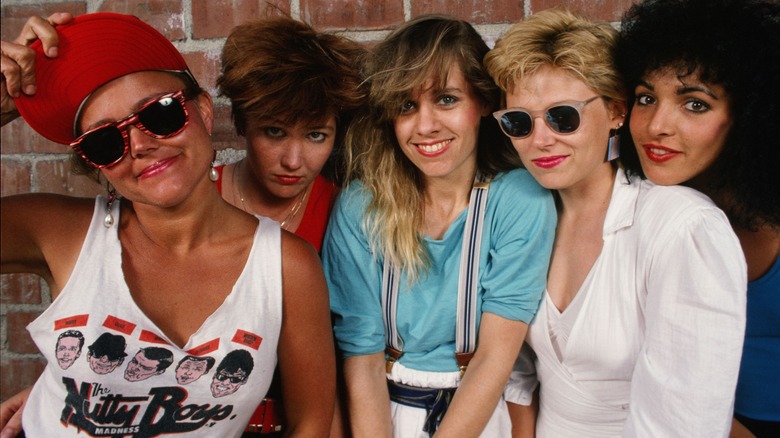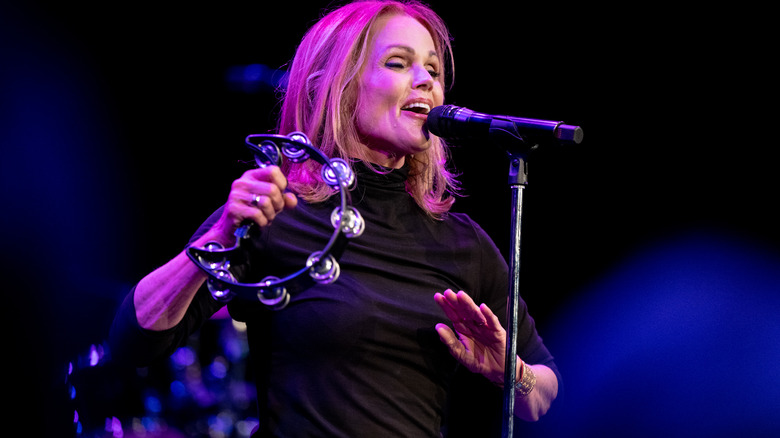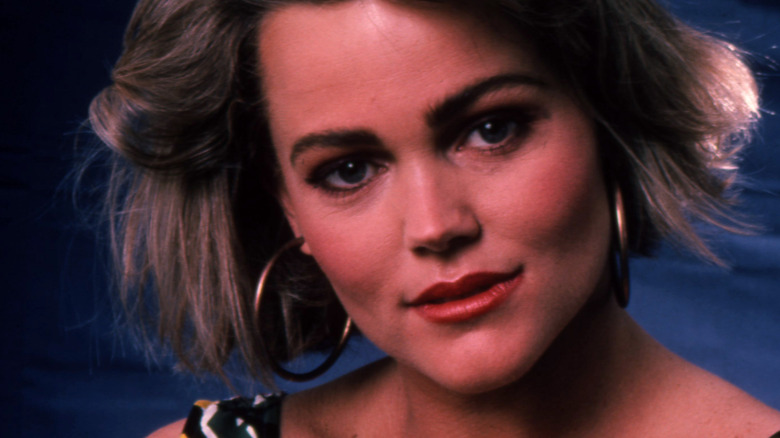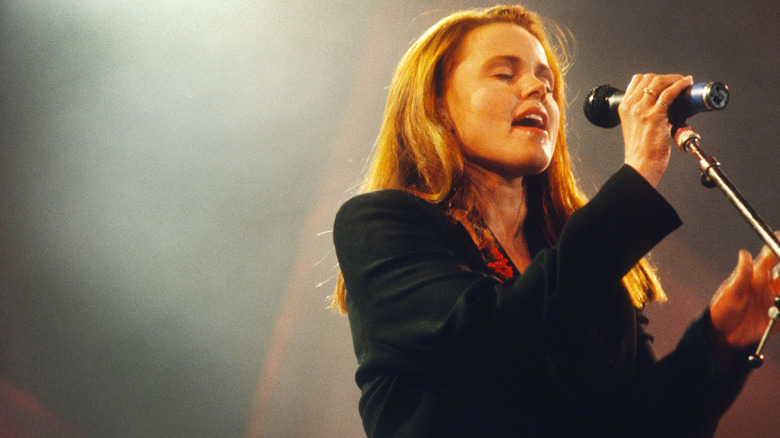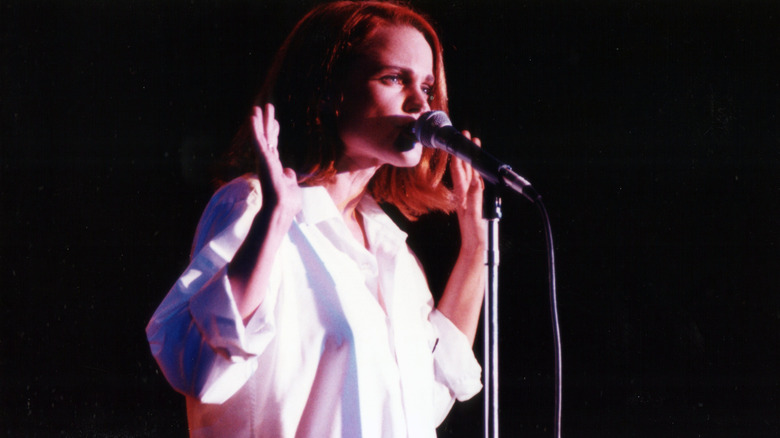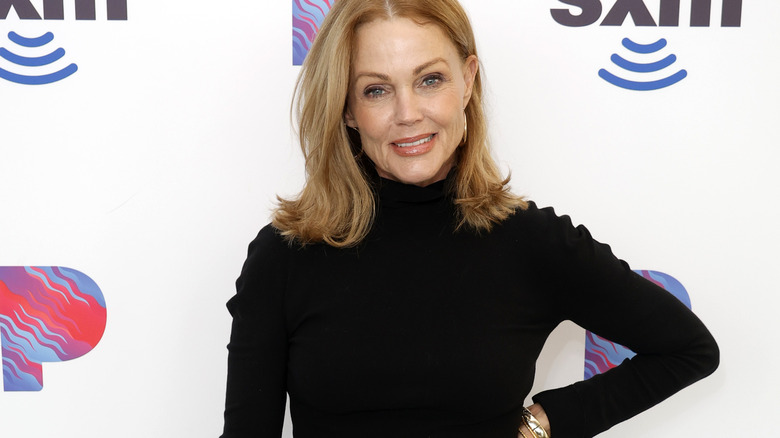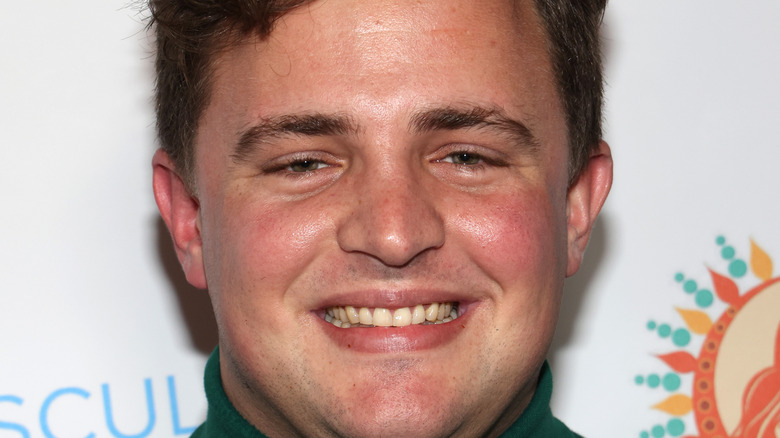The Tragic Real-Life Story Of Belinda Carlisle
There are a ton of great bands that have left their mark on music's landscape, but not many have blazed the kind of territory that The Go-Go's did. While they might be mostly remembered for their pop-punk hits — the sort of songs that are perfect for cruising down a California highway with the top down — the BBC notes that they weren't just a force to be reckoned with, but they were the first and only all-girl group to play their own instruments, write their own songs, and hit it big with an album that skyrocketed to the top of the charts.
And they did it in spite of an industry that had been determined not to take them seriously. The Go-Go's initially failed to find any record label willing to sign them, with rejection after rejection summed up with this sample response: "Unfortunately, The Go-Go's aren't the type of band we're interested in signing. Best of luck with your enterprising girl band!"
The Go-Go's were a perfect storm of pure talent, and out in front was lead singer Belinda Carlisle. Carlisle went on to have a successful solo career after the band's break-up, but at the same time she was making hit after enduring hit, her life off-stage was anything but easy. The rampant sexism faced by Carlisle and The Go-Go's at the beginning of their career was just the tip of the iceberg, and Carlisle's story is one of struggle, addiction, and a sheer determination to overcome it all.
Her childhood was hard and heartbreaking
When Belinda Carlisle released her memoir, "Lips Unsealed," she included a lot of tough conversations about numerous difficult topics, starting with her childhood (via The New York Times).
Carlisle recalled that she had grown up knowing that the women in her life — her mother and grandmother — had big dreams that tragically fell short. Her mother was still in high school when she met Harold Carlisle, a gas station employee two decades her senior. They married when she graduated, and Belinda was born less than nine months later. Her mother would later admit, "I was so stupid ... He was a bum."
Two siblings — a brother and sister — followed in the next four years, and Carlisle wrote that she had no idea why her mother had two more children when she had been so heartbreakingly miserable. Shortly after, they moved to a Thousand Oaks neighborhood, and she described their life as "the low end of working-class and we were among the poorest of the poor." Inside the house, she recalled that tensions were always high: Her father had a temper, she wrote, and her mother didn't trust him. Sometimes, the distrust and anger boiled over to the children, as Carlisle wrote about one terrifying incident that stuck with her for her entire life: "I was literally caught in the middle of one of their more physical arguments, with one of them pulling my legs and the other my arms until it seemed I might split into two pieces."
Her experiences with addiction started with her stepfather
In her memoir (via The New York Times), Belinda Carlisle wrote that after her father lost his job and started his own carpet-cleaning business, he was rarely home. While he was gone, her mother turned to a carpenter across the street, who would ultimately become her stepfather. The rumor mill had been churning in the meantime, and Carlisle found herself ostracized from friends who had been told they could no longer play with her, because of her mother's reputation.
Walt Kurczeski came into their lives when she was young, and she would later write that, "Walt had his own demons, but I didn't know about them then."
According to The Guardian, Carlisle would eventually end up being the eldest child in a home of seven — and it was run by her stepfather, who not only struggled with alcohol addiction, but believed in physical punishments. Carlisle said that he did get sober, and "There were a lot of amends made."
When she was younger, though, she wanted nothing more than to rebel, to escape the home that never felt safe, and prove that he was wrong about her, and that she would make something of herself. By the time she was a teenager, she indicates she was "Hitchhiking, running away, [and] dropping acid."
She's been candid about her own drug use and addiction
Belinda Carlisle, says The Guardian, moved from Thousand Oaks to Los Angeles when she was 18. She immediately fell into the city's thriving punk scene, and for several years, lived in a punk commune that had been set up in an abandoned building. "It was all bands and music," she recalled. "And drugs, of course."
When Carlisle spoke with Hope to Cope, she was candid about the perfect storm of factors that had led to three decades of hard-core drug use. "I found drugs numbed a lot of the pain I had been feeling since childhood," she explained, adding that the longer it went on, the more aware of her own destructive behaviors she was. She knew she had to stop, but when she continued to use, she became trapped in a pattern of addiction. She has been incredibly candid about her experiences, recounting how she relied on drugs to get her through the day, hated herself for continuing to use, and used the drugs to dull the pain of her depression.
And she used a lot, telling The Guardian, "I can't believe I'm not dead. I should actually look like the Phantom of the Opera with just two holes in the front of my face."
If you or anyone you know needs help with addiction issues, help is available. Visit the Substance Abuse and Mental Health Services Administration website or contact SAMHSA's National Helpline at 1-800-662-HELP (4357).
Playing the U.K. was downright dangerous
When The Go-Go's first started, they started with zero experience — and that's not an exaggeration. Belinda Carlisle told The Sydney Morning Herald, "Our only ambition was to learn how to plug our guitars into our amplifiers. We really started from absolute zero and even by punk standards we were incredibly bad. People used to come just to laugh at us."
While they started in Hollywood, they eventually made the inevitable trip to the heart of punk: England. It wasn't easy, though, and in 2020, one-time Tops of the Pops magazine editor Peter Loraine reflected to the BBC and wondered "why they didn't come to the U.K. more often to promote their music because they could have really taken off here."
Carlisle and The Go-Go's toured England with a ska band called Madness, and Carlisle recounted just how bad it was in her memoir (via The Hollywood Reporter). She wrote that they were the target of something called gobbing, which wasn't just spitting, but spitting the nastiest of nasties — in between heckling, catcalling, and requests for a show of a different kind. "It was horrible," she said before explaining, "I remember coming off crying and covered in snot ... It was lonely and it was dangerous, five little white girls from southern California being thrown in with all these hard-core skinheads."
She's detailed the extreme lengths she went to in order to score drugs
When Belinda Carlisle sat down to talk to The Sydney Morning Herald in 2007, she was not only clean, but she had just released her first album in a decade. She spoke about how the years of addiction had changed her voice, and spoke honestly about her — and The Go-Go's — past behavior. "Basically, our behavior was designed to horrify. You have to remember that girls behaving that badly were a real rarity at the time ... We always wanted to have male groupies, but we scared them off."
Carlisle said that while they initially thought they had a handle on things, the real-life story of The Go-Go's is that it quickly spiraled. When they started going on tour, she said, parcels of drugs would be delivered to their dressing rooms via FedEx. It went from being a fun time to not-so-fun, and Carlisle says that she started to see something was wrong when she missed her flight to London five times in a row.
It wasn't just the drugs that were dangerous, it's the lengths she went to in order to procure them. She told Salon that she was in Brazil looking for cocaine when she was directed to an apartment near Ipanema Beach. It ended up being "a drug mill ... It was so hardcore, there were guns everywhere. It's amazing that I'm not dead, honestly."
It took her decades to get clean
Belinda Carlisle's drug use lasted for three decades, and, as she told Salon, she only became clean and sober in 2005. Not everyone around her knew that, though, and she shared that for a long time, she simply sort of just lied through omission. She never outright said that she had stopped drinking and using drugs, and instead, just let everyone think that she had. "I just didn't tell the whole truth," she explained, and behind the scenes, she continued to use.
The sheer length of time it took her to seek help and get clean ended up being the basis for her memoir: "I wanted to write more of an inspirational book about how one can make changes late in life, and about how it's possible to overcome abuse, addiction, and self-sabotage."
It took a long time and a powerful vision for her to commit to change. She wrote in her memoir (via Female First) that it was a vision of her death that finally pushed her to get treatment. It was 2005, and she locked herself in her hotel room for a three-day cocaine binge. She wrote, "When I looked at my eyes in the mirror, I didn't see anyone looking back at me. The lights were out. I was gone. It scared me — yet I didn't stop until I had an extraordinarily frightening out-of-body experience, where I saw myself overdosing and being found dead in the hotel room."
Imposter syndrome, depression, and worthlessness
To describe the rise of The Go-Go's as meteoric isn't an exaggeration, and according to what Belinda Carlisle told The Guardian, they went from not knowing how to plug in their guitars to the top of the charts in just three years. That left her with a deep-seated fear: "[I was] scared that I wasn't any good and the audience would see me as the fake I feared I might be."
Carlisle described her teen years as a time when she was never really comfortable with who she was, and when she was asked about imposter syndrome, she agreed that it sounded very much like what she went through for a long time. (Imposter syndrome, says Healthline, is a condition that brings severe feelings of self-doubt. One of the triggers is attaining something new in life — especially a job or career. Carlisle suspects hers came from the incredibly fast success The Go-Go's found.)
When Carlisle talked to Hope to Cope, she said that those feelings weren't helped by childhood memories. "I was always being told I wasn't good enough," she recalled. She grew up believing it, and when "Beauty and the Beat" charted at number one, she said she was unable to enjoy it. Instead, she was terrified she would be unmasked as a fraud.
Her solo career came with added pressure and an eating disorder
If Belinda Carlisle has been honest about her drug addiction, she's also been straightforward about the stresses and challenges that led her down that path. In 2018, she spoke with Deseret News about how the media's obsession with her weight pushed her to use cocaine as a way of staying thin.
"[The media always] mentioned how much I weighed — so I was 'cute and chubby,' 'pretty and plump.' ... It was always about my weight. ... I never had a problem with it until the media put such a focus on it. ... It really, really messed my head up."
When UC Health announced Carlisle was going to be speaking about her life's challenges in an event in Denver, they also shared some of the struggles recounted in her memoir — including the fact that when she was young, she had been taunted with the nickname "Belimpa." The spotlight only got more judgmental after The Go-Go's broke up the band, and Carlisle embarked on her solo career. In her memoir (via the New York Post), she recalled facing a rebranding as a pop star, and comparing herself to Madonna. That, she said, only escalated the addiction and eating disorders that were already there. "I never had a problem with the way I looked or with my weight ... but the media had a problem with it because I was voluptuous, I was normal. I wasn't jealous of Madonna, I was envious of her and how she looked."
If you need help with an eating disorder, or know someone who is, help is available. Visit the National Eating Disorders Association website or contact NEDA's Live Helpline at 1-800-931-2237. You can also receive 24/7 Crisis Support via text (send NEDA to 741-741).
The album she still can't listen to
When Belinda Carlisle sat down to chat with Classic Pop Magazine, she shared the fact that she rarely listens to any of her past work — but that the reasons for that aren't all the same.
When they talked about her debut album, "Belinda," they mentioned the complete failure of several singles. She considered it a win because of the hit "Mad About You," and the partnership it kicked off with songwriter and producer Rick Nowels. But does that mean she listens to the album? Not so much. According to Carlisle: "I just don't listen to my music ... I do when I have to for work, and I'm going over melodies and things, but I haven't listened to that album in over 20 years."
But when it came to 1996's "A Woman & A Man," Carlisle said that she not only hated the album, but couldn't listen to it. "That album is terrible ... I was in the throes of addiction. I think there are a couple of decent songs, but for the most part it's not very good ... I wasn't as present as I should have been, and I think that shows." It also didn't help that Carlisle had wanted to include the song "Falling Into You," but the record company said no. Celine Dion would later have a massive hit with it.
She's been open about her struggles with menopause
Menopause isn't typically something that's discussed much, even though symptoms and physical challenges can be life-changing for some women. Belinda Carlisle has tried to break some of that stigma, and sat down on Hallmark Channel's "Home & Family" for a conversation not only about her own challenges, but those of her mother.
"My mom had really bad menopause, so I just assumed that I would follow in the footsteps of my mother," she explained. She went on to say that her mother had such bad depression that there had been talk of committing her to a psychiatric ward. They didn't, but she recalled that the time of not knowing what was going to happen to her mother was terrifying. She explained more to The Daily Mail, saying that "She suddenly became really agitated and very, very down and she spent a lot of time sitting in her room crying."
When it came time for her to go through it, she said that she had the irritability and mood swings, but worse than that were the hot flashes that got so bad and so frequent that she resorted to carrying around a change of clothes. She shared, "I tried not to let it get in the way of my life and tried to carry on as normal — you do the best you can."
Her complicated relationship with her son
Belinda Carlisle has one son, James Duke Mason, and when she described their relationship in Advocate, she summed up her feelings like this: "I couldn't be more proud of him ... As a mother, I can't imagine it being any better because I really dodged a bullet. I could've had a teenage girl just like I was — and I was a nightmare — but I had a nice, beautiful gay son."
It wasn't always easy, though, and Carlisle has said (via The Guardian) that her biggest regret in life is that she hadn't been around enough for her son when he was growing up. She recalled the moment that it hit home just how little she had been there for him, saying that it wasn't until after she got sober that he had confessed that when he was young, he had simply believed that she lived at the airport. And that, she said, broke her heart.
Mason, however, has addressed her feelings around being an absentee mother, saying that they were completely unfounded. In a heartfelt Mother's Day letter to her published via HuffPost, he assured her that "not once did I ever feel like she wasn't present. To the contrary, she has always been an amazing mother, and I had no idea she had an issue with substance abuse until long after she'd gotten sober and decided to open up to me about it."
